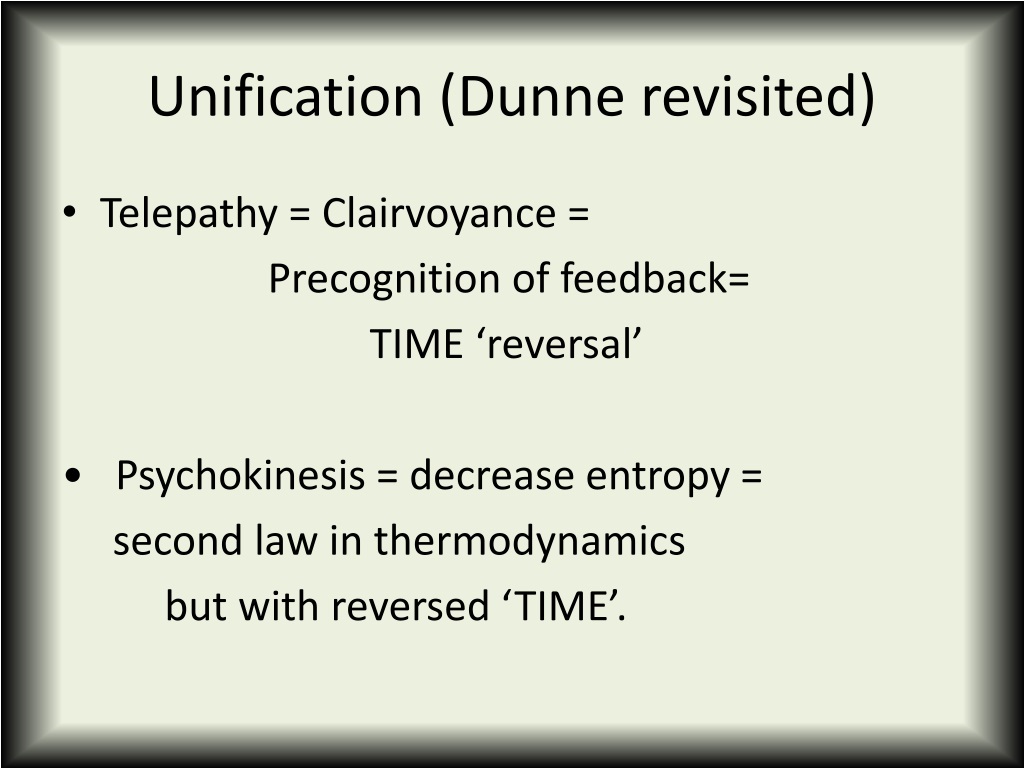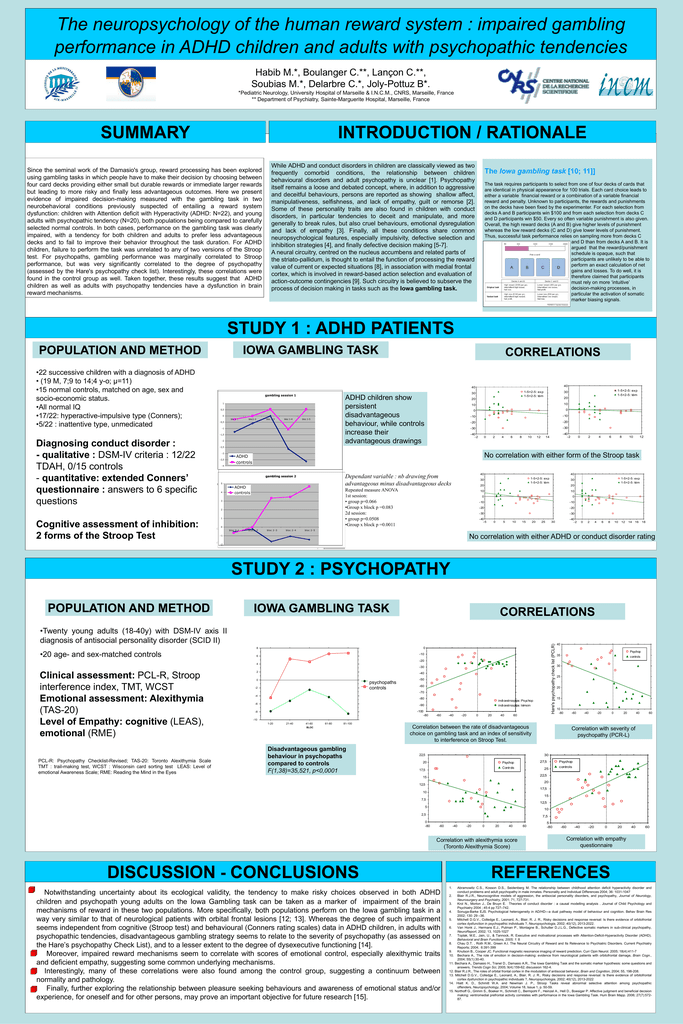Bechara Iowa Gambling Task

Interest in the cognitive and/or emotional basis of complex decision-making, and the related phenomenon of emotion-based learning, has been heavily influenced by the Iowa Gambling Task. A number of psychological variables have been investigated as potentially important in understanding emotion-based learning. The Iowa gambling task (IGT) is the most commonly used task to assess decision-making performance in a clinical setting (Bechara et al., 1994, 1999). The IGT is particularly interest-ing because it mimics the complexity of the choices that we are confrontedwithineverydaylife.Itsdesignincorporatestheunpre. This task is based on Bechara et al's so-called 'Iowa Gambling task' In this procedure, subjects are given $2000 to begin. On each trial, they are given the choice of four decks, and after each card, they are given a reward of some amount; after some cards, they are given a reward and pay a penalty.
Decisions aren't only made through 'rational' and conscious assessment of options; emotional processing matters. But what role does emotion play in decision making? Antonio Damasio's 'somatic marker' hypothesis holds that we use somatic markers (essentially, gut feelings) to guide decisions when cognitive faculties are busy or when we lack resources or information (Damasio, Tranel & Damasio, 1991). These 'gut feelings' may act subconsciously, steering us towards advantageous options even in the absence of a conscious understanding of the benefits or consequences of a choice.
One way Damasio demonstrated the effects of somatic markers was through the Iowa gambling task (e.g., Bechara, Damasio, Damasio, & Anderson, 1994). In this task, participants are presented with four decks of cards and instructed to choose a card from any of the decks. Each time they chose a card, they either win or lose some money based on what card was drawn. The 'trick' to the task, unknown to the participants, is that two of the decks have small rewards and penalties, but over the long-term will lead to a gain of money. The other two decks have large rewards but also large penalties, and over the long-term will lead to a net loss of money.
Typically, participants end up exclusively selecting cards from the money-winning decks, usually within 40 or 50 trials. But Damasio argues that decisions are guided by somatic markers even before participants are consciously aware of which decks are 'good' or 'bad'. Evidence for his claim comes from skin conductance responses (a measure of emotional arousal), which are higher before 'bad' decisions than 'good' ones, even before the participant has consciously recognized which deck is most rewarding. This finding suggests that the emotional system--via somatic markers--guides participants towards the money-winning decks even before they've consciously recognized them (Bechara, Damasio, Tranel, & Damasio, 1997).
Performance in the Iowa gambling task is also sensitive to brain injury. For example, patients with damage to the orbitofrontal cortex continue to choose from money-losing decks and do not show those variable skin conductance responses. Patients with damage to the ventromedial prefrontal cortex also choose bad decks, but their choices are thought to happen because they are unable to recognize that the higher short-term rewards of the losing decks are countered by larger penalties (Bechara, Damasio, Tranel, & Damasio, 2000).
Other researchers have questioned the somatic marker hypothesis and the utility of the Iowa gambling task. Tiago and McClelland (2004) replicated the original gambling task research, but added their own self-report measure of participants' awareness of the long-term advantages and penalties of different decks. Using their method for self-report, participants showed awareness of the advantageous decks even before they began selecting them exclusively, and well before the 40-50 trials Damasio suggested were necessary.


| Standard (default) | Based on the standard Iowa gambling task described by Damasio et al. (1991). Fifty trials are completed using four decks. Two decks have small rewards and penalties, but lead to net gain over time. Two decks have large rewards and large penalties, and lead to net loss over time. |
|---|---|
| Five Decks | This version adds a fifth deck (and ten additional trials) to the standard version. The fifth deck, compared to the other four, has medium penalties and medium rewards, and over time these balance out such that selecting deck five neither gains or loses money in the long run. |
Bechara, A., Damasio, A.R., Damasio, H., & Anderson, S.W. (1994). Insensitivity to future consequences following damage to human prefrontal cortex. Cognition, 50, 7-15.
Bechara A., Damasio H., Tranel D., & Damasio A.R. (1997). Deciding advantageously before knowing the advantageous strategy. Science, 275, 1293-1295.
Bechara A., Damasio H., Tranel D., & Damasio A.R. (2000). Characterization of the decision-making deficit of patients with ventromedial prefrontal cortex lesions. Brain, 123, 2189-2202.
Bechara Iowa Gambling Task Force
Damasio, A.R., Tranel, D. & Damasio, H. (1991). Somatic markers and the guidance of behaviour: theory and preliminary testing. In Levin, H.S., Eisenberg, H.M., & Benton, A.L. (Eds.), Frontal lobe function and dysfunction (pp. 217-229). New York: Oxford University Press.
Tiago, M. & McClelland, J. (2004). A reexamination of the evidence for the somatic marker hypothesis: What participants really know in the Iowa gambling task. Proceedings of the National Academy of Sciences, 101, 16075–16080.
| Trial Number | Trial number in the current block |
|---|---|
| Deck Selection | Deck number chosen by participant |
| RT | Time taken (in ms) to make deck selection |
| Reward | Reward/gain from deck selection |
| Penalty | Penalty/loss from deck selection |
| Current Total | Participant's net total after this trial |
Iowa Gambling Task Bechara Et Al 1994
Bechara’s Gambling Task is more popularly known as Iowa Gambling Task (IGT) which was studied by Antoine Bechara, Antonio Damasio, Hanna Damasio, and Steven Anderson, researchers from the University of Iowa. In this psychological task, the participants’ decision-making skills were observed as they played a virtual card game. Four decks were presented and each one had cards that could give rewards or penalties through game money. Some decks were “good” in the sense that they tend to give more rewards and some were “bad” since they held more penalizing cards. The findings showed that most participants become fairly good at consistently choosing “good decks” after 40 to 50 selections. However, the participants with orbitofrontal cortex (OFC) dysfunction still continued to select the bad decks. Also, unlike their healthy counterparts, the patients with OFC did not show stress reactions in response to losing a lot of game money caused by choosing the bad decks.